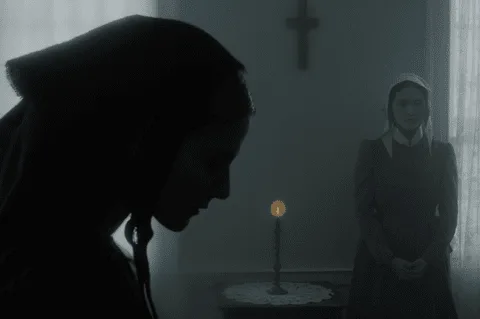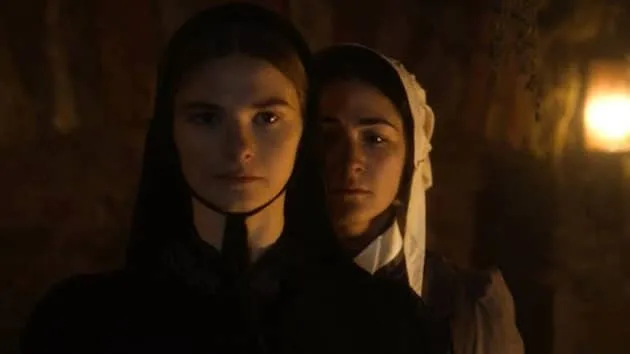
There have been a fair few gloomy period pieces floating around over the last few years, and though it’s somewhat beyond the scope of this review, it would be interesting to ponder why: what is it about oppressive religious belief and isolated family groups which has such ready appeal for writers? We can’t possibly hand every credit to the pandemic. But, for whatever reasons, the likes of The Witch, The Curse of Audrey Earnshaw and The Family spring to mind; The Last Thing Mary Saw has some similarities with these, but – despite early suggestions – it sidesteps the perhaps expected supernatural aspects, instead opting for a character-focused tale where any horror is equally attributable to them.
Early use of a quote by professional nerk John Calvin (“All events whatsoever are governed by the secret counsel of God”) clues us in to the brand of Christianity which is on offer. The year is 1843: in Southold, NY a young woman is brought before an impromptu court and executioner, charged with being in league with the Devil. It may have been relatively late for beliefs in witchcraft or secret covenants, but these kinds of things tend to persevere in remote or otherwise isolated communities, where there’s no fun or ease to wash them away. Things certainly look bad for the girl, Mary: she is blindfolded, but her eyes are streaming with blood. To test her affiliation or otherwise with Old Scratch, the men ask her to recite The Lord’s Prayer – something which those who have gone over to the devil were thought not to be able to do. Mary (Stefanie Scott) nails it first time. The men lower their loaded weapons.
So what has happened to her? Why has she been brought to this place, under arrest? The film begins to backfill her story, returning to the trial proceedings here and there. We first see Mary’s desperate parents asking for help from the family’s fearsome matriarch (Judith Roberts). Mary’s sin seems to be, ahem, fraternising with the housemaid, Eleanor (Isabelle Fuhrman, probably best known as Esther in Orphan). Unusually, and perhaps given the insular nature of this extended family group, they don’t just ship the maid off to an unwitting household some distance away, or marry off their daughter. Instead, they deem it fit that both girls should be punished. This only seems to strengthen the girls’ resolve, and they have to think more creatively to find time together – but it’s dangerous in a house where everyone seems to be lurking and watching. Their best efforts clearly have a limited timespan ahead, and so they have to escalate matters in an appropriately mood-laden, sombre way, of course.
Spying, surveillance and moral judgement are so strongly foregrounded in this film that they very nearly crowd out everything else: on the flip side of that, the film is also largely about the perils of curiosity, which in its way reflects the austere Christian values cherished by the family. Curiosity affects almost everyone here, and the film is rife with people peeping around corners, through ceilings, or rifling through items not their own. It’s fair to say that nothing particularly good comes out of any of it either, for anyone. Whilst taking lesbianism as a key plot point is an unusual one as much as it’s a somewhat thin one, the film is just as interesting in its treatment of class – because there’s no equality in the eyes of God here. Eleanor is treated mercilessly differently on account of her status in the household.
The film is chaptered, because every film which purports to have any moral weight seems to be – it’ll be as easy to age this clutch of films as it is to age someone by a tribal tattoo – but the importance of literacy and reading at least offers some links to this motif. Furthermore, there are lots of excellent stylistic choices which look good. This is a very tactile film, which lots of close-ups on hands. The period detail looks good – there’s lots of that soft candlelight which was front and centre in The Witch – and understandably, given the title, the film focuses closely on Mary herself. Stefanie Scott successfully enacts a look of barely-suppressed sadness and rage very well. Eleanor (Fuhrman) is good too, though they are more plausible as individuals than – crucially – smitten to the point of madness with one another. The sense of rapport does develop as the film progresses, but overall it’s a little tricky to accept, which is a shame, as so much hinges upon this.
Still, overall The Last Thing Mary Saw comes together very well. Whilst it does have aspects in common with other period dramas and horrors, it has a lot going for it in terms of its deliberate, morose pace, strong visuals and determination not to simply ape a gazillion supernatural yarns. It’s not what you’d call an uplifting experience – it feels a lot like getting rained on in a cemetery – so despite the fact that there just may be a small handful of pitch dark humour in some moments, there’s no real let-up in the gloom here, making The Last Thing Mary Saw a pretty effective slab of quasi-historical bleakness. Think the weightiest elements of The Go-Between mixed with Wisconsin Death Trip.
The Last Thing Mary Saw is out on Shudder from 17th January 2022.
